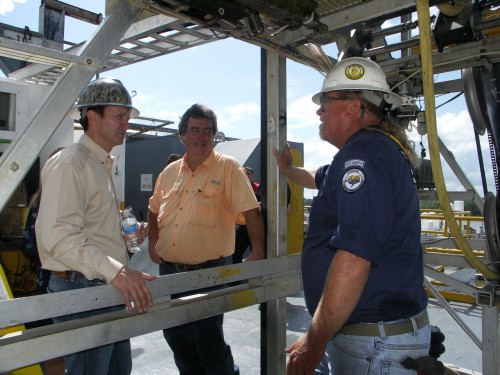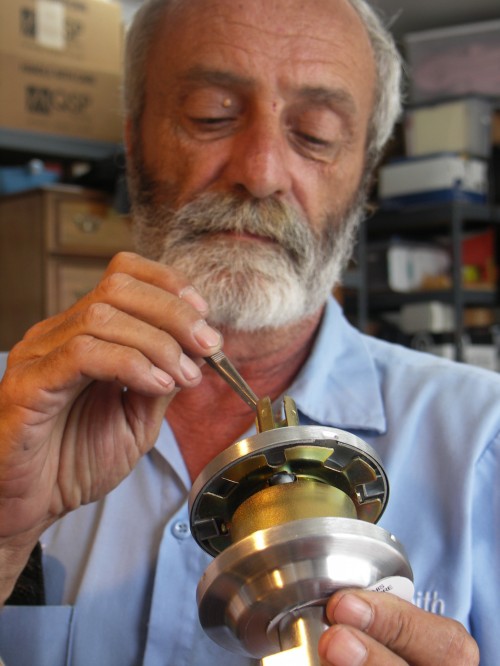
Landry: Training encouraging
May 9, 2012
Sophomore strike slinger
May 9, 2012Avet’s Locksmith
Owner: Mark Avet
Established: 1996
Address: 1906 Polk St., Houma
Telephone: (985) 876-5677
Hours: 24/7
Product: Locksmith
Mark Avet worked in the auto industry for 35 years, 23 of which involved being a parts manager at a Houma dealership. Talented at rebuilding car and truck locks, and simply enjoying the challenge, he started his own locksmith business as a second job during December 1996.
Avet thought it was a smart move when he was 41 to include residential and business locks to his skills list – just to have something to fall back on when he reached retirement age.
Expectation for retirement, however, came a decade earlier than anticipated for Avet, when in 2009 the financially strapped auto industry cut thousands of workers by closing plants and shuttering dealerships across the country. Fortunately for this locksmith he was not shut out of a career.
The plan worked – although not in a manner originally intended – and Avet’s locksmith efforts quickly grew into being a real job.
“When I started in the car business in 1974, one of the first things I had to do was make key cylinders,” he said. “So, I’ve basically been doing this all my life.”
Today, the locksmith works out of a two-car garage converted into a workshop behind his home and services clients needing a variety of lock jobs performed.
In terms of workload, car lockouts are a small portion of his business, while changing locks in homes is more common than many people might think.
A locksmith’s work also includes tooling devices that secure strong boxes, safes, and virtually anything that makes use of a key, tumblers, bars or even electronic pass codes.
Locksmithing is part science and part art, according to Avet. The trade itself dates back as far as the first key-required security devices. The oldest known pin and tumbler mechanism dates back to approximately 700 B.C.
Traditionally, actual locksmiths build locking devices and are as skilled on the working of tumblers, pins and gears as the finest watchmakers. Today, with mass produced locks, most of their work is more maintenance and repair than production.
Each job might have a base price associated with it but can be adjusted to fit the situation. Costs vary per job just as does the complexity of a given project.
“There is more to changing a lock than most people realize,” Avet said while explaining the intricacies of a standard door lock. “I love the challenge of small detail work.”
Avet said there are many things about the locksmith’s life people do not understand. The most significant is how, like most professions during the past 30 years, technology has changed what true craftsmen in this field need to know.
“This trade has gone to a lot of electronics,” he said. “I just finished 16 days of training and looking at new electronic locks. Ten years ago, it was more mechanical, now locks are more electronic. You need to constantly learn about those things to stay in business.”
As with any mechanical or electronic technician, consumers need to make sure the person they are dealing with is licensed, bonded, insured and knowledgeable, according to this tradesman.
Just like any job, this one comes with its frustrating circumstances. For Avet, it’s the situations where damage to a lock could have been avoided.
“You get people that break a key off inside a lock,” he said. “People will try to open a door using the key. They turn a knob by using the key in the lock, but that key is not designed to turn the knob.”
Observing responses to his work have become a hobby for Avet. “I had a car lockout where this woman called from a convenience store and, for some reason, her car engine was running, but the driver’s door was locked. The other three were not. I pointed that out to her and she was upset about it. So, I didn’t charge her.”
Security, for both the locksmith and customer goes beyond a key and hardware. Avet said when he is called to help someone get into a house, or completely change all locks, he requires the customer to present identification at the scene. “They need to prove to me they own that house before I basically break-in for them,” he said. “By law, I’m supposed to call police [if someone is locked out of a home], but the customers usually have some identification.
“A business is where getting in can become a problem,” he added. “Unless it is an interior door, I want to talk to a manager first. Anyone can claim they belong there. I’m not going to be the guy to help them get in and rob a place.”
Integrity and credentials are the most important tools a locksmith has, according to Avet. “People trust you,” he said. “You need to show that you know what you are doing and that you can be trusted. You don’t want some fly-by-night guy doing locks. People want to feel safe.”
Licensing for locksmiths is increasingly strict as consumers grow concerned about their own safety and the security of their property. “That is good because it will help keep the locksmiths that would take advantage of others out of the business,” Avet said.
This locksmith admitted the one thing he wishes consumers would understand is that when they call for help they might not get an immediate response, because most locksmiths are one-man operations.
“I understand if they need help they are usually upset,” Avet said. “But sometimes I am in the middle of something and they don’t understand why I can’t drop everything for them. I had one situation where I was installing a bunch of new locks in a home and a lady called and was locked out of her car. She was upset that I couldn’t drop what I was doing to unlock her car for her. I couldn’t leave the gentleman’s place with all the locks off the doors. I had to finish that first.”
Avet said the single most significant thing he has learned in being a business owner that he wished he had known 16 years ago, is that it is not as frightening as he had originally thought.
“What I like most about it is you get to meet people and solve problems for them,” he said. “It is rewarding.”
Locksmith Mark Avet says constant training and practice help him maintain his skills and keep up with technology and new lock designs.











